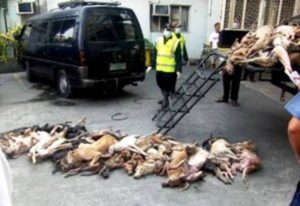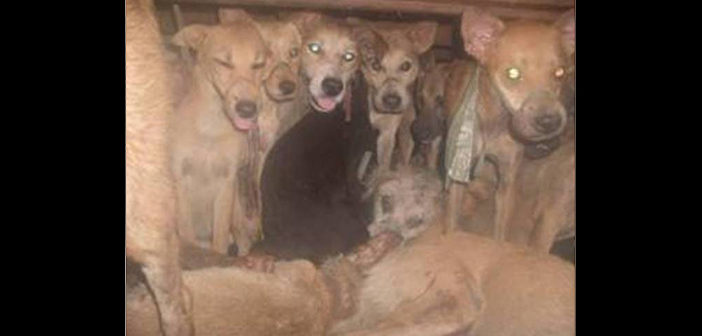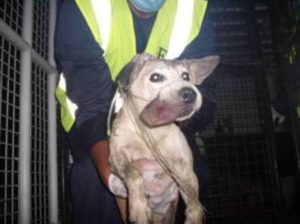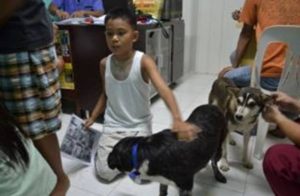(Featured image: Live dogs, slaughter-bound, inside an enclosed van rescued by AKF in the northern lowlands)
By Greg Salido Quimpo – Campaign Manager, AKF
When the uninitiated discover that dogs in the Philippines are slaughtered and sold for human consumption, they probably think the country lacks regulations on animal welfare. Although only small groups of Filipinos eat dogs, estimated to be less than 1% of the country’s 102 million people, there already exists a law on the treatment of animals passed in 1998 (RA 8485). In fact, the Philippines’ capital city, Manila, prohibited the killing and selling of dog meat earlier than 1982 (MMC ORD 82-02).

Dog carcasses intercepted by AKF in the south bound to be gutted and dressed for the market in the north of the Philippines.
There is an exemption in the Philippine Animal Welfare Act of 1998 that says dogs can be slaughtered for a ritual sanctioned by local leaders. Section 6, Paragraph 1 of the act says, “When it is done as part of the religious rituals of an established religion or sect or a ritual required by tribal or ethnic custom of indigenous cultural communities; however, leaders shall keep records in cooperation with the Committee on Animal Welfare”.
In the northern highlands of the Cordillera, a family dog is viewed to have the purest spirit and once offered to the gods – slaughtered and eaten by each family member – will protect a family from further bad luck. As explained in an online article by Dr. Nestor Castro, cultural anthropologist and chairman of the University of the Philippines’ (UP) Department,
“It has become a market [dog meat eating], and has really transformed from its original roots,” he said, emphasizing that not all Filipinos eat dog meat and that it’s an inaccurate stereotype to say otherwise. Mr. Castro added that originally dog meat was used as food for certain types of rituals and special occasions. Locals in the Cordillera Region of Northern Luzon, he noted, slaughtered dogs only for ritual occasions. “Generally all animals there, not just limited to dogs, are sacrificial animals. Chickens, pigs, or carabaos are butchered, whether for someone who died or for a celebration. The dog goes into that picture, as a special occasion food.” He added that the offering of one’s own could be the ultimate symbol of sacrifice. “I would say if you treat your dog as your best friend, therefore, to sacrifice your best friend must be really special.”
The Philippines being a country of mostly Catholics (more than 75 million Filipinos), rites to partake of the host (symbolically Jesus Christ’s body) are sacred practices in the Philippine churches. Hence similar practices of indigenous groups are given exemption, e.g. partaking of the dog meat, seen as part of Catholic Filipinos’ own cultural belief.
The commercialization of the dog meat mushroomed in the lowlands of the Cordilleras, north of Luzon. Prior to the campaign of Animal Kingdom Foundation (AKF), the market of Baguio City, capital city of Benguet province of the Cordillera, openly sold dog meat until 2012. Restaurants there sell dog meat dishes. The live dog source comes from the south of Luzon, eight hours by land, as the southerners are not known to be dog meat eaters. Livestock traders from the CALABARZON provinces (Cavite, Laguna, Batangas, Rizal and Quezon) included the dog, as well as cattle and goats, as part of the trade to the north where high-valued vegetables and fruits are harvested.
Only in Baguio and La Trinidad, its neighboring city, do mainstream dog meat serving restaurants operate.
AKF, founded in 2002, has rescued and recovered around seven thousand dogs from the illegal trade, some of them lucky to be alive. Presently, there are less than a hundred dogs at the AKF center, located at least three hours away by land travel from Baguio City. As the only official partner of the Philippine government in the campaign against the dog meat trade, AKF has carried out 250 raids.
AKF investigators gather evidence on the activities of dog meat traders, especially from the south of Luzon, and coordinate with the police for rescue operations. More than 200 cases have already been filed by AKF against the dog meat traders, and 80 of them have been meted out sentences.
One has to be part of the raiding team to understand the cruelty inflicted to the dogs. Their muzzles tied shut by strings, their tongues swollen because they bit them as their snouts were forcefully tied; dead ones piled up by the weak ones; and the stench, it never leaves you – it is as horrible as the sight before you. AKF almost always bury half of the number of dogs recovered from these raids.
From 2013 to 2014, AKF has seen a substantial decrease of dogs transported for slaughter. Within 2013, a total of 341 slaughter-bounds dogs were recovered from an eight month operation, while in 2014 a total of 95 slaughter-bounds were recovered from a series of operations over 11 months. This is a far cry from the 365 dogs recovered in 2011 within a seven month operation.
In 2015, AKF has so far rescued one dog and recovered approximately 20 kilos of dog meat from three separate operations. It has become difficult to trace the dog meat traders, but AKF is relentless in pursuing them.
__
Find out what you can do to help at: www.animalkingdomfoundation.org
Facebook account: https://www.facebook.com/akfuk
E-mail at: akfadvocates@gmail.com








1 Comment
Thanks for this article, Greg! I generalized a lot — then I read this. You’re one of my heroes, an inspiration to me and everyone on this site. Thanks for your compassion and good work! I’ll share this article and donate to AKF soon…